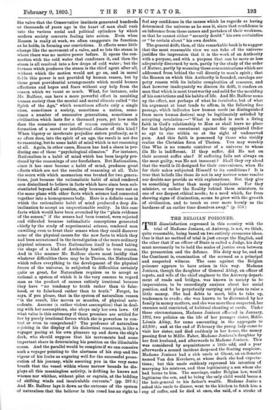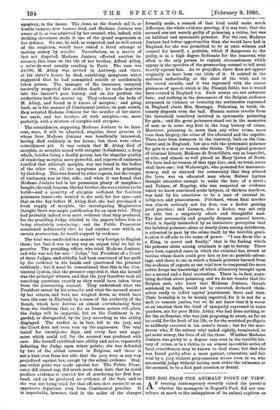THE BELGIAN POISONER.
THE dissatisfaction expressed in this country with the trial of Madame Joniaux, at Antwerp, is not, we think, quite reasonable, being based on two entirely erroneous ideas. One is that no method of trial is just except the English, and the other that if an officer of State is called a Judge, his duty must necessarily be to hold the scales of justice even between the prosecution and the defence. His duty may be, and on the Continent is, examination of the accused as a principal and suspected witness. The case against the Belgian poisoner appears to have arisen in this way. Madame Joniaux, though the daughter of General Ablay, an officer of repute, and wife of the chief engineer to the Antwerp depart- ment of roads and bridges, was known in society to be impecunious, to be exceedingly anxious about her social position, and to be perpetually carrying out plans to raise a little money. She had debts to meet, bills to take up, tradesmen to evade ; she was known to be distrusted by her family in money matters, and she was more than suspected, her enemies said convicted, of habitual cheating at cards. Under these circumstances, Madame Joniaux efftcaed in January, 1892, two policies on the life of her younger sister, Mlle. Leonie Ablay, for sums amounting in the aggregate to £3,800; and at the end of February the young lady came to visit her sister, and died suddenly in her house, the money passing first to Mdlle. Faber, Madame Joniaux's daughter by her first husband, and afterwards to Madame Joniaux. This was considered by acquaintances a little odd, and a year afterwards a second incident deepened the floating suspicion. Madame Joniaux had a rich uncle at Ghent, an ex-Senator named Van den Kerchove, at whose death she had expecta- tions; but this uncle suddenly expressed his intention of marrying his mistress, and thus legitimising a on whom she had borne to him. The marriage, under Belgian law, would legitimise the son, and be being the only child would becon e the heir-general to his father's wealth. Madame Joniat x asked this uncle to dinner, went to the kitchen to fetch him a cup of coffee, and he died at once, she said, of a stroke of apoplexy, in the house. The fama, as the Scotch call it, or hostile rumour, now became loud, and Madame Joniaux was aware of it, as was admitted by her counsel, who, indeed, with striking cleverness made it one of the grand arguments in her defence. No one, he said, so suspected, and so well aware of the suspicion, would have risked a third attempt at making money by murder. Nevertheless, as a matter of fact not disputed, Madame Joniaux effected another in- surance, this time on the life of her brother, Alfred Ablay, a ne'er-do-weel usually residing in Paris. The sum was £4,000, M. Ablay was invited to Antwerp, and there, at his sister's house, he died, exhibiting symptoms which suggested that be bad committed suicide or accidentally taken poison. The manager of the insurance company naturally suspected this sudden death ; he made inquiries into the insurer's past history, and on his petition the authorities took the matter up. They exhumed the body of M. Ablay, and found in it traces of morphia ; and going back, as is the manner of Continental justice, on past events, they arrested Madame Joniaux for the murder of her sister, her uncle, and her brother, all with morphia,—or, more probably, with a mixture of morphia and atropine.
The coincidences, supposing Madame Joniaux to be inno- cent, were, it will be admitted, singular, three persons in whose lives Madame Joniaux was beneficially interested, having died suddenly in her house ; but there were other coincidences yet. It was certain that M. Ablay died of morphia, or morphia mixed with atropine (belladonna), a drug which, besides being a deadly poison, has the singular quality of rendering morphia more powerful, and experts of eminence testified that although morphia was not found in the bodies of the other two, all the symptoms pointed to poisoning by that drag. This was denied by other experts, but the weight of testimony was on that side; and when it was found that Madame Joniaux had in her possession plenty of morphia— bought, she said, because, like her brother, she was a victi m to the habit—and a quantity of atropine sufficient for fourteen poisonous doses—she wanted it, she said, for her eyes—and that on the day before M. Ablay died, she had purchased a fresh supply of morphia, the investigating Magistrates thought there was ample justification for an open trial. They had probably indeed even more evidence than they produced, for the presiding Judge alluded to the papers before him as being abso]ntely convincing ; and the Public Prosecutor mentioned indiscreetly that he had another case which, on certain provocation, be would support by evidence.
The trial was conducted in a manner very foreign to English ideas; but that it was in any way an unjust trial we fail to perceive. The presiding officer, who tried Madame Joniaux, and who was not her sole Judge," but President of a Court of three Judges, undoubtedly had been convinced of her guilt by the evidence in his hands, and questioned the prisoner ruthlessly ; but it must be remembered that this is the Con- tinental system, that the prisoner expected it, that she herself was the principal witness, and that the jury therefore took all searching questions exactly as they would have taken them from the prosecuting counsel. They understood what the President meant by his remaila, and what the accused meant by her retorts, and were not weighed down, as would have been the case in England, by a sense of the authority of the Bench, which here derives an almost overwhelming force from the tradition that, as far as human nature will allow, the Judge will be impartial, but on the Continent is re- garded, or disregarded, by the jury according to the ability displayed. The verdict is, in fact, left to the jury, and the Court does not even sum up the arguments. The trial lasted for twenty-one days, and every fact and argu- ment which could tell for the accused was produced with care. She herself exhibited rare ability and nerve, repeatedly defeating the Judge upon minor points; she was defended by two of the ablest counsel in Belgium, and there is not a hint even from her side that the jury were in any way prejudiced against her, except by the actual evidence. Stay, one unfair point was made against her. The Public Prose- cutor did almost say, did much more than hint, that he could produce evidence to convict her of murdering her first hus- band, and as he produced no evidence of the fact, and as she was not being tried for that offence, that seems to us an oppressive departure even from Continental practice. It is improbable, however, that in the midst of the charges
formally made, a remark of that kind could make mach difference, the whole evidence proving, if it was true, that the accused was not merely guilty of poisoning a victim, but was an habitual and systematic poisoner. For the rest, Madame Joniaux had better opportunities than she would have had in England, for she was permitted to be at once witness and counsel for herself, a position, which if dangerous to the guilty, is in a high degree fortunate for the innocents who often is the only person to explain circumstances which appear in the speeches of the prosecuting counsel to tell most heavily against him. As to prejudice, there does not appear originally to have been one tittle of it. It existed in the- audience undoubtedly, at the close of the trial, and in the crowd outside, and it was expressed with the coarse plainness of speech which is the Flemish foible, but it would have existed in England too. Such scenes are not unknown here ; and nothing in the demeanour of the Belgian audience surpassed in violence or brutality the sentiments expressed in England about Mrs. Montagu. Poisoning, in truth, in- tensely disgusts even the bad. Human nature revolts from the household treachery involved in systematic poisoning for gain ; and the great poisoners stand out in the memories of men as in some way first in the long history of crime. Moreover, poisoning is, more than any other crime, more even than forgery, the crime of the educated and the capable. There have been instances to the contrary, both on the Con- tinent and in England; but as a rule the systematic poisoner for gain is a man or woman who thinks. The typical poisoner of criminal history, Madame de Brinvilliers, was as beautiful,, as able, and almost as well placed as Mary Queen of Scots. We have had no woman of that type here, and, we trust, never shall have one ; but Wainwright, who poisoned for insurance- money, and so alarmed the community that they altered the laws, was an educated man whom Bulwer Lytton thought attractive enough to make the hero of a novel ; and Palmer, of Rugeley, who was suspected on evidence which we know convinced acute lawyers, of thirteen murders,. was held by his associates to be a man of unusual in- telligence and pleasantness. Pritchard, whose final murder was almost certainly not his first, was a doctor gaining good practice; and Lamson, also a doctor, was not only an able but a singularly adroit and thoughtful man. The fact necessarily and properly deepens general horror,. which is finally intensified by an instinctive perception that the habitual poisoner, alone or nearly alone among murderers, is attracted in part by the crime itself, by the horrible grati- fication it affords to the sense of power. "I can doom like a. a King, in secret and finally," that is the feeling which the poisoner alone among criminals is apt to betray. There have been repeated cases in which the criminal has struck at victims whose death could give him or her no possible advan- tage, and there is one in which a female poisoner learned from the evidence of experts at one trial how to compound the more subtle drugs her knowledge of which ultimately brought upon her a second and a fatal accusation. There is, in fact, some- thing devilish about poisoning, and we do not wonder that the Belgian mob, who knew that Madame Joniaux, though sentenced to death, would not be executed, declared them- selves ready to inflict capital punishment there and then. Their brutality is to be keenly regretted, for it is not for a. mob to execute justice, but we do not know that it is worse as an emotion than the kind of sympathy expressed in some quarters, not for poor Mdlle. Ablay, who had done nothing, or for the ex-Senator, who was just proposing to atone, as far as he could, for the fault of his life, or for the wretched profligate so suddenly executed in his sister's house ; but for the mur- deress who, if the solemn trial ended rightly, terminated, to- get some money, the lives of all the three. Whether Madame Joniaux was guilty to a degree rare even in the terrible his- tory of crime, or is a victim to an almost incredible series of fatal coincidences, may be known to God alone, but that she was found guilty after a most patient, exhaustive, and fair trial by a jury without prepossession seems even to us, who- necessarily judge without having seen either the witnesses or the accused, to be a fact past question or denial.







































 Previous page
Previous page